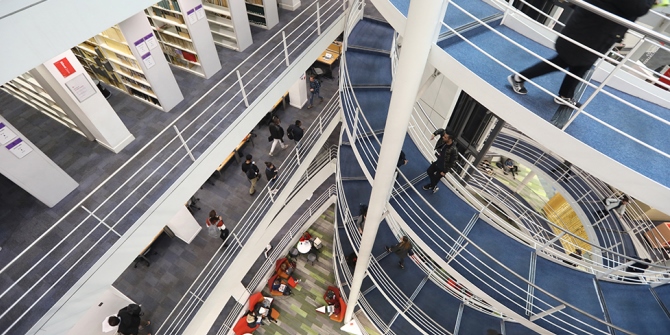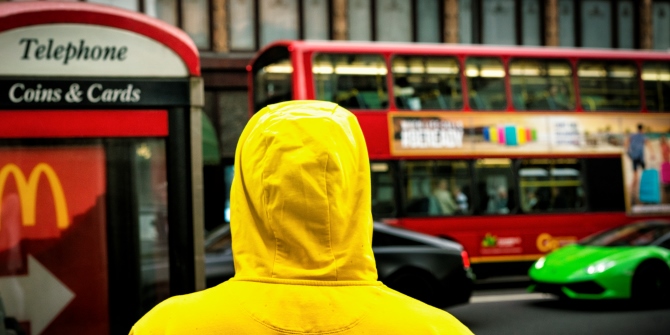by Riad Azar, Doctoral researcher in the LSE’s Department of Sociology
“I still feel like a nurse, man.” Hugo heaved out a long sigh through his nose. We had been sitting in the kitchen of my flat for an hour. The tea he requested when the interview began had chilled; his back curved forward, resting his elbows on his knees to make a nest for his head in his hands. After discussing at length Hugo’s childhood, his dreams and desires, anecdotes of his father, his journey to London and the life he lives as a trained and experienced ICU nurse pouring beer at a pub in King’s Cross, I moved the interview forward by presenting him with a hypothetical:
I: Have you ever had to use your skills, as, say someone falling down on a bus?
H: Not yet, actually…[sigh] I would maybe not be the best, because that’s one year and a half I haven’t been practising…No, I’m losing my skills man, [pause, to himself] I’m losing them definitely…
Hugo is a character that has become common in the cafés, fast food restaurants, taxi cabs and hotels of Great Britain: the deskilled migrant professional. London is swallowing immigrants as it grows to take its place in the hierarchy of global cities, strategically positioned as the European Union’s largest metropolis and with a colonial history that has carved avenues across the globe. A deciding factor in this position is the ease with which new immigrants have been able to find work, with employment levels now higher among new migrants than British born whites (Demireva, 2011). Considering these numbers, the scholarly literature has begun to focus around how many of these jobs are being taken by migrants who possess a higher skill set and who are undertaking significant downward mobility (Anderson, 2006), some going so far as to claim the dawn of a new “migrant division of labour” (May et al., 2007). Recent research has begun to probe how this downward mobility has taken its toll on migrants’ identities, subjectivities, and aspirations for the future. My research seeks to continue this discussion by asking the question: How do downwardly mobile migrant professionals experience deskilling.
To answer this question, I interviewed nine deskilled migrant professionals between April and July of 2014. My interviews lasted between 60 and 90 minutes, depending on the participant. As the interviews were in-depth, qualitatively rich and steeped in ‘thick’ descriptions, the sample size reflects my preoccupation with depth rather than breadth in seeking an answer to my research question. My research finds its place at the conjunction of the sociology of labour and the sociology of migration, interpreted through the lens of symbolic interactionism.
Work and Labour
Classical research in the field focused around industrial relations and management. Proponents of Marxist conceptions of working life stressed alienation and class conflict between labour and capital, while contrarian positions regarding the proper organisation of work for the smooth operation of an organisation divided themselves into Fordist and Taylorist camps. What is at stake in this debate is how workers can be embedded into the modern economy. Marxist interpretations see this in light of the contest of power surrounding capital as a social relation, while the Fordist and Taylorist positions are contrasted as methods of good management. Within this debate, we see the emergence of a literature regarding the conciousness of the worker, both in regards to the skills that a worker can or cannot utilise in relation to the drive towards automation and work as a socialising space for modern individuals. Harry Braverman’s (1975) research into his own experience as a worker on a factory floor ties the two to create a synthesis between a working life and an individual identity. Skills, a symbol that distinguished man from machine, influenced the individual and how she saw herself within the larger organisation. Work began to be viewed as a deeply personal experience, one which held a certain pride and status leading to a growth in demands for representation to management, (Freeman and Rogers, 1999) and also shaped the individuals’ dispositions towards feelings of self and others (Lane, 1959; Sennett and Cobb, 1972).
I began by asking the respondents to describe how they came to their working lives and their specialised fields of knowledge. Ali, who spent the better part of a decade as a Farsi language journalist in Afghanistan, traced his motivation from youth:
You know [pause] from my childhood, I really loved news. Every night, every night, we, all families together we listened to BBC radio station. Because the BBC at that time was the only news station [pause] trusted news station for Afghan people, that we could have Afghanistan news from Afghanistan, from BBC. And I think I grew up with, with news, news. Hmm, that’s why I learned very quick how to [laughs] work as a journalist.
My respondents not only took personal gratification from their working life, it also influenced the way they carried themselves as social actors. As they came into their roles, they expressed to me images of their selves that were deeply ingrained in the personality of their working life. When speaking about gaining confidence Frederic, an ABD PhD student, said:
You will see, in a class you will see five hundred students in front of you, so if you can speak in front of five hundred people, and then you go to another, you see two hundred people, a hundred people you see, OK, I’m used to it, so that gave me confidence, and then it gave me just a love for this job.
Migration
The scholarly literature on the sociology of work and labour was viewed alongside theoretical typologies regarding the migration of professionals. However, these typologies all fail where my research begins, that is, within the cracks. They assume that the job those professionals were intending to occupy (or one of equal stature) will actually be occupied by them. While deskilling has become a known concept within the context of technological change in the sociology of work, literature on migration has come up short in analyses of this phenomenon. I therefore continued my interviews by asking my respondents how they became migrants. Due to a deterioration in civil society in Iraq, Salma, a professor and researcher in astrological physics, described to me her decision to flee:
You can spend the whole day doing nothing, doing nothing, and come back and just make, they make your life terrible, and just going there [to the university] itself was very dangerous, and then I started [pause] to receive some threat in my university so I just said no way I have to leave, and then I left.
The very institutions that are tasked with regulating new entries into the field failed, leaving a majority of the respondents with an acute sense of alienation and despair. Hugo spoke at length about his frustrations with the Nursing and Midwifery Council who he claims had extended his period of being unable to find suitable work for failing to explain to him what sorts of documents were necessary to receive a PIN number:
…so I came with these three papers and I was like ‘yea, look that’s my background can you give me some help’, and she was like, ‘yea, you have to first do this form and then send this, and this’, and I said ‘yea but can you give me some help, and can you try to call the French reference’, and everything, and she was like ‘no’, and but, ‘can’t you help me more?’, and she was like ‘what are you expecting’, and that this sentence is something I really always remember, ‘what are you expecting’, with this [laughs] with this moody face or whatever, and I was like ‘some help!’, and I just took this newspaper I in my, in my, just grabbed this newspaper I had in the tube, and I show her and the first page in this standard, evening standard shit newspaper, ‘look!, more than 95% going in the ANE they wait more than four hours because there is not enough nurses’, and I told her like, ‘I’m a nurse, qualified, I come here in London, I’m, maybe I’m not the best English speaker, but I’m, I want to work with you, and you need some nurses, so why don’t you help me more!’ she said, ‘we can’t do nothing for you’…I lost my motivation.
Fixed Skills and Mobile Symbols
As the CV becomes the way to document and display skills, it is a vital symbol in the struggle of the deskilled migrant professional to get back on their feet. The question becomes, who will look over the CV and how will they interpret the types of credentials migrant professionals possess? Research in the field of how societies assign positions and allocate value has shown that employers have the final say, even when the skills they desire are not qualitatively related to the occupation (Jackson, 2007). Hugo demonstrates what happens to those who are able to get face-to-face with a potential employer; others, because of language barriers, do not make it past the Job Centre, and the CV becomes a testament of a past life of accomplishments met with an uncertain future. Frederic’s experience at the Job Centre was one of stagnation:
For people in the Job Centre, because they asked me, normally you would go to there OK, and they’ll say to you, ‘OK you can do a cleaning job, you can do this, whatever happens.’ But when I hand them, all my, my CV, what I’ve been doing, they didn’t know from where to start because first of my English they couldn’t say go and look for some teaching jobs, at the same time it was really embarrassing for the person, who I was dealing with, who was dealing with my case to ask me to be a cleaner…He was feeling embarrassed, I could feel it, even though it became like, Oh I’m just going in and signing, signing every time. At one point he asked me just to do my best, to learn more English, and to restart my career by going to University
Taking the fall from a successful professional life to becoming a benefit recipient took its toll on the respondents. Salma describes in detail:
S: Yes, the problem here is not just with the job, the job and the benefit here, while you are on benefit you feel yourself, like an, I don’t know how shall I say [pause] insect? I can’t tell that, so you don’t feel yourself normal.
I: What does that mean to feel like an insect?
S: You don’t feel you are a normal human, you are like, because this benefit is especially for poor people who are not able to work, not able to do anything, are you understand me, so me with all these skills, even my husband, and then sitting down and taking the benefit, it’s just, really a horrible feeling. And unfortunately that’s something we will never ever get rid of it, unless a miracle happened.
A sense of insecurity plagues those who I spoke to in the context of this research. Being unable to guarantee themselves a respectable position in their work, most feel themselves drifting. While some have been lucky in going through the motions proscribed by the bureaucracies they have been assigned to, others encounter a much less promising future. Salma describes the feeling:
I don’t know, I just don’t know, have you ever walked and you don’t feel you are walking on the [pause] floor? Do you have something like that? Could you feel something like that? The same thing…
Sociological inquiry focuses on action, but at the heart of what the respondents related to me was the antithesis. Waiting compromised a majority of their time; whether it was waiting for bureaucracies to receive PIN numbers and certifications as in the case of Hugo, waiting to learn the language such as in the cases of Salma, Sofia and Mahdi, and/or waiting to receive the beneficial status of residency that would confer the privileges of cheaper tuition rates for those seeking to further their education like Frederic. It was in this slice of time that most of my respondents felt that their skills began to decay, that they became unfamiliar with what once was their profession. Javier Auyero (2012) describes this process as becoming a patient of the state – being socialised into a role not as citizen, but one as patient whilst the waiting process takes a toll on expectations.
The literature on the formation of professional identities is clear in detailing the iterative nature of senses of self as defined in an interaction with others. As my findings have shown, professional identity formation is a process that while basing itself in initial education and personal motivation (Ibarra, 1999), is further calibrated through the experience (or lack of experience) of working in the field (Sims, 2011). With this interactionist viewpoint in mind Salma’s experience is definitive of the majority of my respondents, who felt that the non-recognition of their credentials which were so close to their professional identities and senses of self was an act of symbolic violence, one strong enough to affect them socially and psychologically.
In contrasting the oral histories and lifeworlds of my respondents with some of the major themes of the sociology of work and migration, my research illuminates where the scholarly literature falls short and from where a new framework to view this unique typology can be drawn from. In particular the sociology of work and labour, itself a product of the creation of the modern workplace, casts a light on the creation of skills and later the relative valuing of those skills based on categories of class, gender, and race. Respondents’ oral histories give credence to the idea of skill as a socially constructed and contested category that engenders differing valorisations between socio-cultural contexts. Through this trajectory of locating skills as a socially constructed category, the literature has also shown that working life is a socialising experience, and if skills are seen as aspects of an identity, then the removal or non-recognition of those skills is a personal, traumatic experience.
References
Anderson, B. (2006). Fair enough? Central and East European migrants in low-wage employment in the UK. [York, England]: Joseph Rowntree Foundation.
Auyero, J. (2012). Patients of the state: The politics of waiting in Argentina. Durham: Duke University Press.
Braverman, H. (1975). Labor and monopoly capital: a Degradation of work in the twentieth century. New York: Monthly Review Press.
Demireva, N. (2011). New migrants in the UK: employment patterns and occupational attainment. Journal of Ethnic and Migration Studies, 37(4), pp.637–655.
Freeman, R. and Rogers, J. (1999). What workers want. Ithaca: ILR Press.
Ibarra, H. (1999). Provisional selves: Experimenting with image and identity in professional adaptation. Administrative Science Quarterly, 44(4), pp.764–791.
Jackson, M. (2007). How far merit selection? Social stratification and the labour market1. The British journal of sociology, 58(3), pp.367–390.
Lane, R. (1959). The Fear of Equality. American Political Science Review, 53(01), pp.35–51.
May, J., Wills, J., Datta, K., Evans, Y., Herbert, J. and McIlwaine, C. (2007). Keeping London working: global cities, the British state and London’s new migrant division of labour. Transactions of the Institute of British Geographers, 32(2), pp.151–167.
Sennett, R. and Cobb, J. (1972). The Hidden injuries of class. New York: Vintage Books.
Sims, D. (2011). Reconstructing professional identity for professional and interprofessional practice: A mixed methods study of joint training programmes in learning disability nursing and social work. Journal of interprofessional care, 25(4), pp.265–271.





